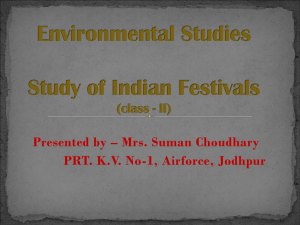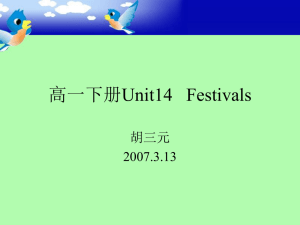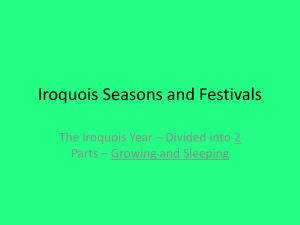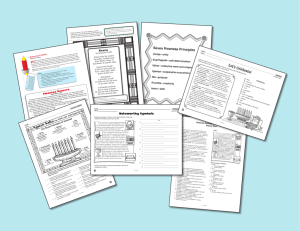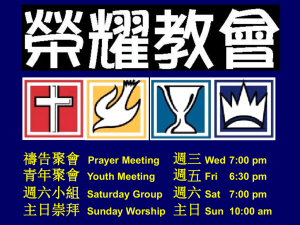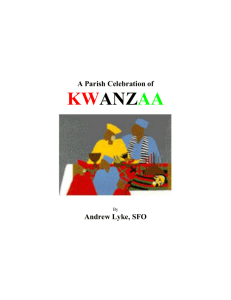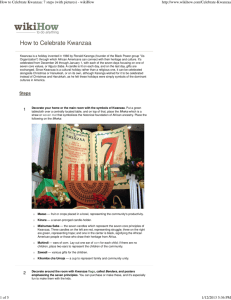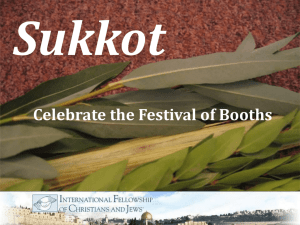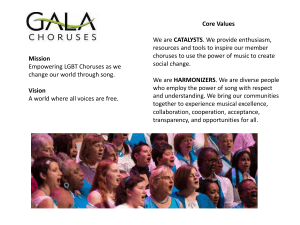unit14 festivals
advertisement
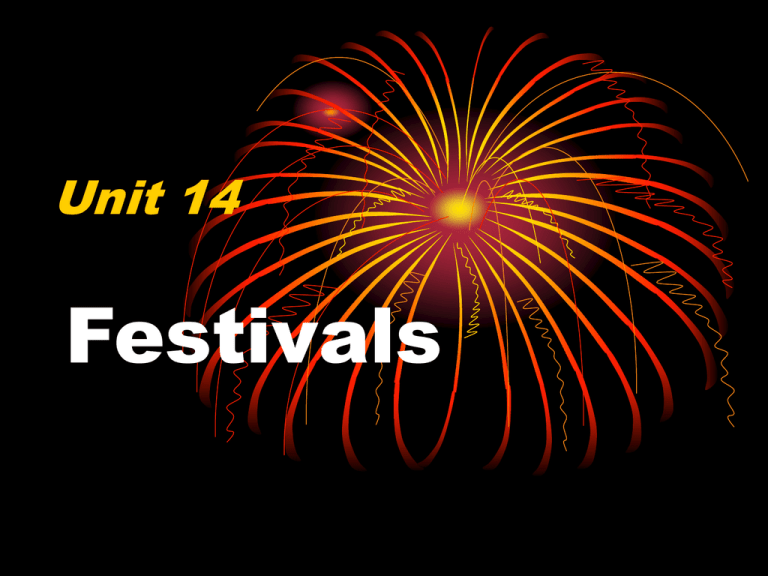
Unit 14 Festivals Halloween USA and Europe Trick or treating? Obon Japan Floating paper lanterns Day of the Dead Mexico Lighting candles for prayers to the dead Festivals in China The Spring Festival The Dragon Boat Festival The Mid-autumn Festival The Lantern Festival The Double Ninth Festival Teachers’ Day National Day New Year’s Day The 1st day of the 1st lunar month The 5th day of the 5th lunar month The 15th day of the 8th lunar month The 15th day of the 1st lunar month The 9th day of the 9th lunar month September 10th October 1st January 1st Lion dancing The Spring Festival red packets let off firecrackers The Spring festival St.Valentine’s Day The Dragon Boat Festival eat rice dumplings and watch dragon boat races The Mid-Autumn Festival eat mooncakes enjoy the moon Festivals in other countries • Christmas Day • December 25th st Sunday • The 1 • Easter • April Fool’s Day • Thanksgiving Day • Halloween after the full moon between March 22nd and April 25th • April 1st • The 4th Thursday of November • October 31st Christmas Day Father Christmas Christmas Day Father Christmas Mardi Gras parade costumes Ramadan Muslims Arabic lunar calendar Easter Bunny Easter a religious festival Easter eggs In both British and American English, HOLIDAYS are often a time to remember some important person or historical event. People usually take advantage of the occasion to get together with family and friends to eat, drink and be merry. But a holiday can serve a purpose that benefits all people by promoting peace, happiness, friendship or nature. Because it serves all people, the holidays can be celebrated around the world. However, when talking about personal leave from work or study, American English uses the word VACATION. FESTIVALS take many forms: not all are national or major celebrations. Do you know this? THE BIRTH OF A FESTIVAL 1. What is Kwanzaa? And when do people celebrate it? 2. When was Kwanzaa born? Why did people create it? 3. What does Kwanzaa mean? 4. In what way do people in Africa celebrate “first fruit” festivals? 5. Try explaining “honour their ancestors” THE BIRTH OF A FESTIVAL 1. What are the Seven Principles of Kwanzaa? Can you tell us without looking at your books? 2. What is the exact date of Kwanzaa? 3. Why do people choose such a special time to celebrate Kwanzaa? core sentences which follows The week following Christmas Day, many African-American families get together to greet the new year and think about the past. which celebrates Kwanzaa is a seven-day festival celebrating the culture and history of African Americans. The festivals were a way to celebrate history and culture, a way to build society, and a way to celebrate the new year. We must remember our past and build our future. Since Kwanzaa is a time for learning as well as joy, people celebrate it by lighting a candle each day. core sentences Festivals help us understand who we are, remember where we come from, and share our hopes for a happy future. As we celebrate them (festivals), we make new history and develop our culture. Kwanzaa was born in 1966, when people created a new festival so that African Americans would be able to celebrate their history and culture. The people who created Kwanzaa used the word for “first fruit” in Swahili, one of the largest languages in Africa. This way, people who celebrate Kwanzaa can enjoy the spirit of the holidays without all the commercial activities of Christmas. notes taking Kwanzaa is a festival celebrating the culture and history of African Americans, as well as __ __ __, which lasts __ ___. The people who created Kwanzaa used the word for “__ __” in Swahili. The African first-fruit festivals had many things ___ __. People ___ get together to celebrate their harvest, give thanks for their life and ___ ___ ___. The Seven Principles of Kwanzaa come from the ____ of the African festivals. They are ____ ___ ___ ___ ___ ___ ___. Kwanzaa is a time for ____ and ___ without all the ______ activities of Christmas.People celebrate it ___ lighting ____ candles which stands for the seven principles. language study I. People celebrate Mardi Gras by dressing up in costumes … You don’t need to dress up for this dinner. I don’t want to go to their wedding because I hate dressing up. I just love the fun of dressing up in ancient costumes. The little girl dressed herself up as an angel. dress: vt. dress sb (oneself) be(get) dressed in… +衣服或表示颜色的词 vi. dress up dress up in… / dress up as … 穿 put on 的 讲 throw on 究 pull on 穿鞋,戴帽,穿衣裳 wear 戴首饰,眼镜,发型 匆匆穿上.. have on 随便穿上(袜子,手套) be dressed in language study II….people would get together to celebrate their harvest; people used to give thanks for their harvest and for life. would: 一般跟动态性动词 used to: 可跟动态性和状态性动词. Exx. He ______ come to my home for help when he had any trouble. He ______ be a teacher. When he was there, he _____ go to that coffee shop at the corner after work. A. would B. should C. had better D. might III. The festivals were a way to celebrate history and culture… Kwanzaa is a seven-day festival celebrating the culture and history of African Americans. language study IV. Since Kwanzaa is a time for learning as well as joy… e.g. He is nice as well as considerate. = He is nice and considerate as well. 他正学英语,也学法语. V. We must do as much as we can to make our community better. Exx. He will drive as carefully as he can _______ (avoid) any accidents. He ran as fast as he could ______(catch) the bus. We will do everything we can ______ (save) our country. They did whatever they could ______ (stop) the conflicts. language study VI. Our friends will play tricks on us and try to fool us. If a person is taken in, he or she is called “April fool”! Exx. I. Please take the washing in, if it rains. 把…带进来 II. Japan refused to take in the refugees. 收容;留宿 III. Give me time to take in the whole situation. 理解,体会,了解 IV. She didn’t take in what I said. V. The tour takes in some famous old castles. VI. She was not easily taken in. VII.She totally took him in. 包含;包括 欺骗,蒙骗 (常用被动) language study VII. Each time we celebrate a festival it changes a little and in that way we keep our culture alive. each time: 每次;引导时间状语从句 e.g. every time; the moment; once Exx. 1. 每次我一感冒,我的背就痛. 2. Every time when I think of my faraway mother, I will telephone her. VIIIl. 重要句式 No fighting or conflicts are allowed. It is a reminder that … and that… It is not a sad day, but rather a day to celebrate the cycle of life. 1. Not he but you ___ (be) wanted on the phone. 2. ___ (be) not you but he going to Beijing on business? 3. Neither you nor I ___ (be) able to persuade him. 4. There ___(be) one or two things I’d like to know about. 5. Not you but ___ ___ to blame. A. him; is B. he; is C. him; are D. he; are 6. E-mail, as well as telephones, ___ an important part in daily communication. A. is playing B. have printed C. printed D. have printed 7. The teacher, as well as a number of students, ___ asked to attend the party last Sunday. A. was B. were C. is D. are compare… to…; compare… with…; compared with(to) 1. The youth is often compared ____ the morning sun. A. with B. to C. by D. as 2. ____ with what you did last year, you have made great progress this year. 边 讲 边 练 A. Compared B. To compare C.Comparing D.when compared celebrate; congratulate 1. We ____ him on having passed the examination. 2. The people ___ the victory. 3. I want to ____ you with all my heart. 4. The press ____ his braveness in fighting the thief. A. congratulated B. celebrated C. congratulations D. celebration dress sb / oneself ; be dressed in sth; wear; put on; have on 1. Our English teacher ____ a black coat today. A. is having on B. is putting on C. wears D. dresses 2. They are going to ___ the boy in new clothes. A. dress B. wear C. have on 边 讲 边 练 D. put on 3. The first thing she did after getting up in the morning was to dress for her two-years-old daughter. 4. While in the college, he used to grow long hair. 5. He got up, dressed and went out in a hurry. 6. Have on your overcoat before going out. no…or & and 1. They have no books ___ magazines for sale. 2. It can still live for a long time with no water ___ no food. allow 1. Children are not allowed ____(play) in the garden. 2. They don’t allow ____(throw) litter around, and neither do we. have … in common; in common with 边 讲 边 练 1. ___ most young people he hates getting up in the morning but likes staying up late at night. A. As B. In common C. Liking D. In common with 2. They had nothing in ___ and no wonder they divorced. A. common B. usual C. ordinary D. general do as much as (all; everything; what; whatever) sb can to 1.He is poor in English, so he has decided to spend as much time as he can ____ (study) English. 2. Don’t you think we should do as much as we can ____ (help) our friends out? used to ; would 1. Now he doesn’t have enough money to spend on books as he ____. A. would B. used to C. spent D. do 2. There ____ a cinema here before the war. A. would be B. used to have C. used to be D. were 3. ---Are you a football player? ---____. A. Yes, I was B. No, but I used to be C. Yes, I used to D. No, but I am 边 讲 边 练 4. People ___ believe that the earth was flat, which is not the case, as we know now. A. would B. used to C. were used to D. are used to 1. Often he ____ sit for hours doing nothing at all when he was in low spirits. 演 练 2. It is ____ walk from the school to the place where I live. 平 A.10 minutes B. 10-minute C. a 10-minutes D. a 10-minute 台 A. should B. would C. could D. might 3. He’s sure we’ll win the match, but I don’t ____ his faith in the team. A. share B. believe C. exchange D. join 4. The rising crime rate has become ____ major concern of ___ society. A. the;the B. a;/ C. /; the D. a; a 5. The taxi driver often ____ passengers to take their belongings when they leave the car. A. watches B. catches C. remembers D. reminds 6. We should do as much as we can ____ our country better and more beautiful. A. make B. makes C. making D. to make 7. One learns a language by making mistakes and ____ them. A. correct B. correcting C. corrects D. to correct 8. The winter of 1990 was extremely bad. ____ most people say it was the worst winter of their lives. A. At last B. In fact C. In a word D. As a result 9. Roses need special care ____ they can live through winter. A. because B. so that C. even if D. as 10. Your performance in the driving test didn’t reach the required standard--- ____, you failed. A. in the end B. after all C. in other words D. in fact 演 练 平 台 11. The woman was ____ by the businessman’s offers of marriage and stupidly gave him most of her money. 演 练 12. A committee was set up to ___ the causes of the plane 平 crash. 台 A. taken in B. taken on C. taken off D. taken out A. look up B. look into C. look out D. look around 13. The conflict spread everywhere, into villages, ____ into the cities. A. rather than B. or else C. as well as D. instead of 14. The Shanghai you see today is quite a different city from what it ____. A .was used to B. was used to do C. used to be D. used to do 15.People celebrate Mardi Gras __ dressing __ __costumes. 16.He played a trick __ Jane and he had to apologize __ treating her __ a nice lunch. 17.___ April Fool’s Day if a person is taken __, he or she is called “April Fool.” 18.It reminds us that we need to care __ the world we live __ and learn to respect life and nature. 19.___ common __ many other boys, he liked baseball. 20.I don’t believe __ him. He has no faith __ life. 21.If you compare Kwanzaa __ Christmas, you can find it is similar ___ Christmas in some way. 22. A. On Nature Day people don’t allow destroying nature. B. On Nature Day __ __ nature is allowed. 演 练 平 台 23. A. In this book the writer tells us how the festival was born. B. In this book the writer tells us about ___ ___ ___the festival. 24. A. Many families have a party to welcome the new year. B. Many families ___ to ___ the new year. 25. A. We must do our best to make our community better and more beautiful. B. We must do ___ ___ ___ we can to make our community better and more beautiful. 演 练 平 台 1. Many students signed up for the 800-metres-long race in the sports meeting to be held next week. 2. People used to giving thanks for their harvests and for life. 3. People celebrate Kwanzaa by light a candle each day. 4. Many teachers worry about the effects of television for young people. 5. Some children spend on more time watching television than they spend in school. 6. We must do as much as we can make our community better and more beautiful. 7. Because so much viewing, children may not develop the ability to enjoy themselves. 8. The nature is at its best in spring. errors self assessment 1. ___ food you’ve cooked! A. How a nice B. What a nice C. How nice D. What nice 2. I was really anxious about you. You ____ home without a word. A. mustn’t leave B. shouldn’t have left C. couldn’t have left D. needn’t leave 3. Tom ought not to ____ me your secret, but he meant no harm. A. have told B. tell C. be telling D. having told 4. Sir, you ____ be sitting in the waiting room. It is for women and children only. A. oughtn’t to B. can’t be C. won’t D. needn’t 5. Would you slow down a bit, please? I can’t _____ you. A. hold on to B. put up with C. make up to D. keep up with. 6. Have a good rest, you need to ____ your energy for the tennis match this afternoon. A. leave B. save C. hold D. get 7. Mrs Smith went to her doctor for ____ about her heart trouble. A. an advice B. advices C. advice D. advise 8. There are so many beautiful pairs ____ that I can’t decide which to buy. A. to be chosen B. to choose from C. to choose D. for choosing 9. We all write ____, even when there’s not much to say. A. step by step B. by and by C. now and then D. more or less self assessment 10.The girl was too young to ____ easily. A. take in B. be taken in C. take up D. be taken up 11. ____ I got to the reading-room, I found that he ___ there. A. At every time; read B. Each time; reads C. At each time; would read D. Each time; was reading 12.Her mother ___ tell her stories patiently every evening when she was a little girl. A. would B. should C. could D. use to self assessment grammer assessment I. had better should ought to 表示劝告had better(not),建议should(not), 命令ought(not) to 表示推测,“理应……” should (ought to) + do should (ought to) + have done shouldn’t (oughtn’t to) + have done 1.---I’ll tell Mary about her new job tomorrow. ---You ____ her last week. A. ought to tell B. would have told C. should have told 2.There was a lot of fun at yesterday’s party. You ___ come, but why didn’t you? A. must have B. should C. need have D. ought to have II. must have to have got to 表示主观的义务和必要must, 表示一种客观的需要“不得不” have to, 常可与have got to 互换 must 引起的疑问句,肯定回答用 must; have to 否定回答用 needn’t; don’t have to (不必 mustn’t 表示禁止,意思是“不能,不许” have to 的否定形式是 don’t have to,相当于 needn’t. have got to 的否定形式是 haven’t got to 表示肯定的推测,“一定是,必然”must do (对现在) must be doing (正在进行) must have done (过去) 表示否定的推测,“一定没有”can’t (couldn’t) do(have done) 表示可能的推测,“可能” may (might) do(have done) 1.Mike, you ___ play with fire. You ___ burn yourself. A. won’t; can’t B. mustn’t; may C. don’t have to; must D. have got to; shouldn’t 2.You ___ see the doctor, Joe. You don’t look very well. A. must B. shall C. may D. can 3. ---Must I clean the window now? ---No, you ___. A. mustn’t B. needn’t C. can’t D. may not 4. Jack’s ill, so they ___ change their plan. A. must B. should C. have got to D. ought to 5. Harry has been reading all day--- he ____ be tired. A. should B. has got to C. has to D. must self assessment 盛装 按照…的看法 欢迎新年 圣诞接下来的星期 也 自主,自我决定 通过点蜡烛 每次… 农历日历 代表 一根点燃的蜡烛 欺骗… 给…提供… 一个七天的节日 有很多共同之处 尊敬长辈 尽可能多地做 商业活动 信任… 使我们的文化生存 开某人玩笑 自从 重大节日 一个不寻常的方式 主题 庆祝生命的轮回 和…相似的 象征 用…装饰 嫉妒的 月亮是财富和运气的象征 事实上 大象游行 围成圈 每年的节日
